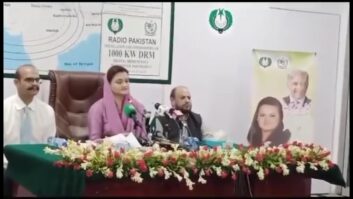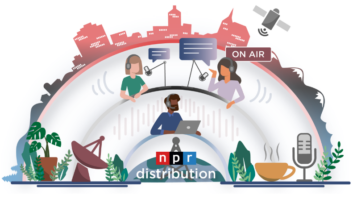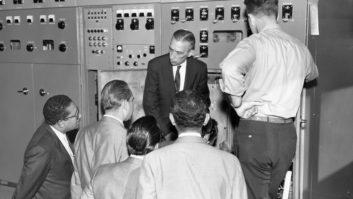The BBG’s current USIB organizational chart. (Click to Enlarge)
United States international broadcasting (USIB) is at a critical juncture as it faces new, 21st century challenges.

In a recent Woodrow Wilson Center paper, we proposed a new vision for U.S. international broadcasting: a single, non-federal, congressionally-funded broadcasting organization that unites the current six USIB entities into one, with a revitalized mission employing the latest technologies in an “audience-centric” communications strategy.
This reform will be essential to maintain an effective U.S. presence in an often hostile international media milieu.
USIB remains the leading edge of American soft power; the principal means by which theUnited States speaks directly to less free and impoverished nations, including North Korea, Iran, China, Afghanistan, Pakistan, Russia, Belarus and Cuba.
USIB works, but not nearly as well as it could. Its Cold War organizational legacy of multiple,partly duplicative broadcasting organizations detracts from maximizing its potential reach and impact.
Legacy hampers innovation
The Cold War role of USIB, as a highly effective tool of U.S. “soft power,” has been widely acknowledged. Voice of America, Radio Free Europe and Radio Liberty all made important contributions to the political, economic and social transformation of Eastern Europe and the USSR, in moving away from communist authoritarianism.
By denying controlled state media the monopoly on information and public discussion, USIB helped keep critical thinking alive and fostered an understanding of democratic alternatives.
However, the two-pronged Cold War communications strategy of “telling America’s story” (VOA) and providing a “surrogate free press focused on domestic issues” (RFE and RL) is no longer relevant in the new international media environment.
Moreover, two USIB organizations, VOA and RFE/RL, have now grown to six (adding the International Broadcasting Bureau, Radio Free Asia, Radio and TV Martí and the Middle East Broadcasting Network), with overlapping language services, duplicative management and support structures, and largely un-coordinated missions and operations.
This hodgepodge of U.S. broadcast organizations, often competing among themselves, can no longer be defended on either mission-related or budgetary grounds, and hampers a rational allocation of resources in line with American strategic priorities.
New technologies have also dramatically altered media consumption patterns worldwide.
Satellite television is now more important than radio in most areas, especially in the high-priority target area of the Middle East. Social media, such as Facebook and Twitter, are taking on increasing importance for international broadcasters as was seen in the Arab uprisings of 2011–2012.
Communications are no longer one-way but an interactive dialogue between sender and receiver and among receivers on various platforms.While the role social media played in fostering political change in the Arab uprisings may have been exaggerated, as with all technologies, they can be used for good or ill.
Just as political activists seeking democratic change can use these new technologies to their advantage, they can also be employed effectively by repressive regimes for their own less noble purposes.
Outmoded structure
Congress and the OMB are showing less tolerance for multiple legacy broadcast organizations with overlapping activities and management structures.
The Government Accounting Office issued a report in January that focused on overlap.Unlike the Cold War era, where a strong case could be made that VOA and RFE/RL were largely complementary, they and their more recent siblings Radio Free Asia, the Middle East Broadcasting Network (comprisingAlhurra TV and Radio Sawa) and the Office of Cuba Broadcasting (Radio and TV Martí) are now often viewed with considerable justification as duplicative.
USIB broadcasters produce programs in 59 languages, targeted on countries, which, with three exceptions, lack fully free media. Roughly a third of these languages (20) are carried by two of the broadcasters (VOA and RFE/RL or RFA).
The different and often competing elements of USIB have strong patrons among America’s politicians and pundits, who have little appetite for seeing favored broadcasters reduced, consolidated with the same language service of another USIB broadcaster, or eliminated.
The current structure impedes allocation of resources according to strategic priorities. Funding for broadcasts to Cuba, for example, nearly match funding for broadcasts to China, which is of major strategic importance, and that funding is divided between VOA and RFA.
A changed global, political and media environment, new technologies, heightened friendly and adversarial competition, budgetary pressuresand outmoded legacy structures and their political patrons have coalesced to place USIB at a critical juncture. Major institutional reform is essential to meet the challenges of the 21st century.
Audience-centric
All USIB — if it is to serve American strategicinterests and compete successfully in the fragmented and rapidly diversifying global information market place — must focus on intended audiences and be attuned to their culture, perceptionsand information deficits.
It must be more than audience-focused; it must be audience-centric.
And that “audience” should be plural: audiences. Within a given society, key elites and other social groups have different information needs from those of the general population, and reliable market intelligence is crucial in determining changing target audiences and communications strategies to reach them with credible, objective news and analysis.
The challenge today is to recast USIB as a single organization, funded by Congress but not part of executive branch, that will produce and distribute audience-centric programming efficiently on multiple platforms.
This organizational structure would be similar to the BBC World Service (in its former, more independent state), the National Endowment for Democracy, and the United States Institute of Peace, all of which are funded by government grants but are guaranteed operational independence.
Distance from government — a firewall — is essential to ensure the journalistic professionalism, free from bureaucratic interference, that is crucial to the credibility of the operation. Governance should be provided not by a federal agency (such as the Board for International Broadcasting, which oversaw RFE/RL prior to 1995, or the Broadcasting Board Governors today), but by a non-partisan board of directors including individuals with journalism and foreign affairs experience who exercise oversight but delegate management functions to the executives it appoints.
A single new organization, congressionally funded but non-federal, would avoid duplication of resources and permit maximizing capabilities devoted to individual countries on a rational basis. As a non-profit entity, it would avoid the stigma of “official radio or TV,” which other international broadcasters (apart from China and Russia) have avoided or are now abandoning.
The proposed new organization would not abolish language services of the current broadcasters but would incorporate them as building blocks supported by a central news operation, with the eventual goal of one language service to a given country using a given technology.
The new organization would preserve, not abandon, respected brands that have acquired equity over time in their respective broadcast regions — the VOA brand in Asia, Africa and Latin America, RFE/RL brands in Eurasia, RFA brands in East Asia and, increasingly, MBN brands in the Middle East.
U.S. international broadcasting has a proud and successful history and even in its current unwieldy state does many things right. But bold restructuring is required to respond vigorously and credibly to 21st century challenges.
Comment on this or any story. Email [email protected] or post below.
A. Ross Johnson is a Wilson Center Senior Scholar and Hoover Institution Research Fellow. He has held senior management positions at RFE/RL including director of Radio Free Europe. R. Eugene Parta is a consultant on international broadcasting issues. He is retired director of audience research and program evaluation at RRE/RL and was chairman of the Conference on International Broadcasting Audience Research. They are co-editors of “Cold War Broadcasting: Impact on the Soviet Union and Eastern Europe,” Central European University Press, 2010.












